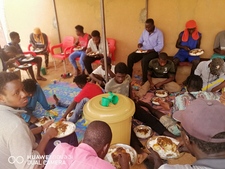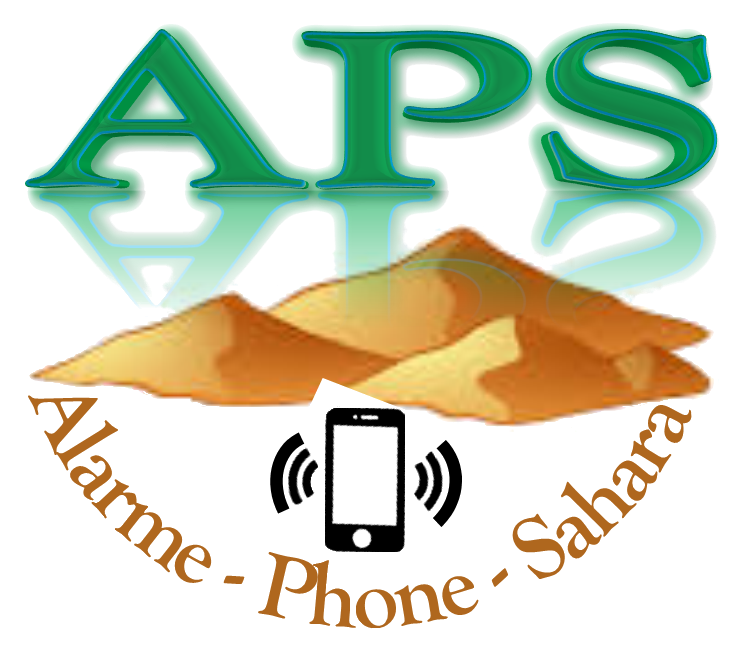Since July 2020, the team of Alarme Phone Sahara (APS) in Agadez/Niger has been organising with great commitment every Saturday a collective kitchen for migrants currently living in the city of Agadez.


The collective kitchen is a practical answer to a situation in which many migrants and refugees are stranded in Niger and struggle for survival every day under very precarious conditions. This situation has been extremely exacerbated by the global corona crisis.
Since the migrants in Agadez usually live together with other people of the same origin, 30 people from one of these communities are invited for each kitchen. In addition to the expenses for the purchase of food, transport costs are incurred, because most of them live in migrant quarters, so-called ghettos, far away from the city centre.
The initiative of this collective kitchen is very popular among the different communities.
It is an expression of hope and solidarity for these people when they are occasionally served a rich and tasty meal and drinks, as it is usually impossible for them to eat enough.
For the APS team Agadez, the kitchen is an important element to get in touch with the migrants, which helps to build up a relationship of trust and information to raise awareness of their rights and opportunities as migrants.
Furthermore, the collective kitchen helps to strengthen self-organisation and mutual solidarity within the different migrant communities.
Migrants and refugees stranded in Niger
For years, Niger has been a transit country for a large number of migrants and refugees who cross the Saharan countries to the north. The city of Agadez is still the starting point for many convoys travelling through the desert to Algeria and Libya, although there are more and more secret migration routes away from cities, also due to the increased criminalisation of the transport of migrants. The EU, which has externalised its border regime on African soil, is investing billions of euros in African transit countries such as Niger to stop migrants on their way and force them to return to their countries of origin. And the northern bordering country Algeria has been carrying out mass deportations to Assamaka on Niger's border for years, mostly of West African citizens. Also, from Libya migrants and asylum seekers come to Agadez after they have fled Libya again because of torture and imprisonment.
The corona crisis considerably aggravates this already very difficult situation. Faced with the Covid-19 crisis, many of these migrants and refugees, who can neither go forward on their journey nor return to their countries of origin, now find themselves stranded in Niger. And so many thousands of people are trapped in extremely severe conditions in Niger and increasingly in Agadez. Even for Nigerien citizens, the state does not provide adequate public infrastructure, medical care and services, and even less for refugees and migrants.
The international intergovernmental structures, in particular the United Nations High Commissioner for Refugees (UNHCR) and the International Organisation for Migration (IOM), are also failing to assume their responsibility for ensuring decent living conditions for these people. Life is even more precarious for those who live outside the official camp structures, scattered and far away, as already mentioned, in so-called ghettos.
The collective kitchen is a solidarity response to this deplorable situation.
After the first four months and 23 collective kitchens (datas of December 2020), the collective kitchen has already become a special place for migrants. There were kitchens with 13 West African communities, three especially for women, one for the Sudanese community, one for people expelled from Algeria and a special edition with various communities, mostly religious dedicated for the Tabaski festival. The local APS team is now providing more intensive support to individual, particularly vulnerable people. Lost connections to family members are restored, but new approaches to self-organisation are also emerging. For example, a rap song has been created by the young Guinean King Papi via the collective kitchen. The song deals, among other things, with the dangers of crossing the desert and how important it is to seek advice from organisations such as the APS.
The migrants in Agadez need the collective kitchen, the collective kitchen needs reinforcement. We are happy about donations, collections, solidarity events of all kinds!
Network APS and Team APS Niger
Make a donation to ensure the continuity of the activity!
Donation Account:
Globale Gerechtigkeit e.V.
IBAN: DE67 4306 0967 2032 2373 00
BIC: GENODEM1GLS
reason for payment:
Collective kitchen in Agadez
Donations are tax deductible.
Together for freedom of movement and equal rights,
together for a world of solidarity for all!

